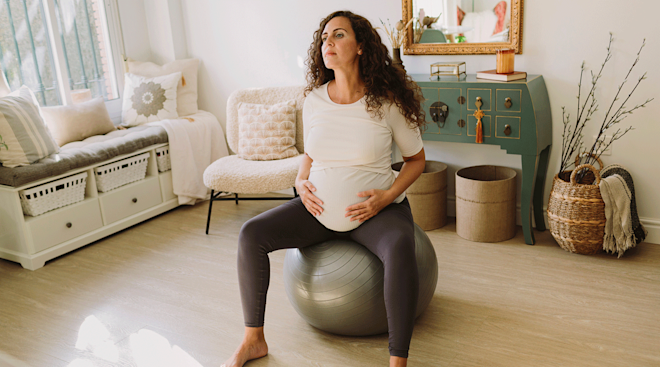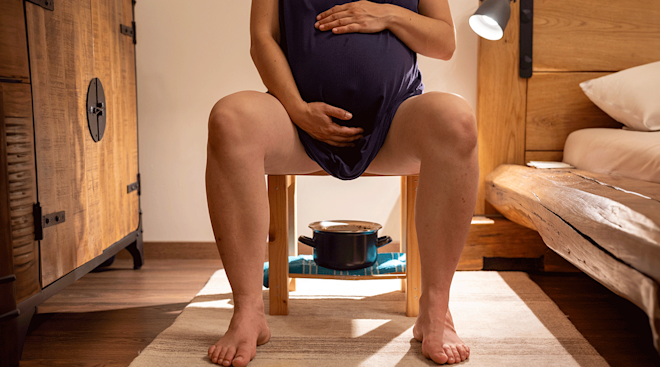Inducing Labor: What to Know About the Induction Process
By the time you reach those final weeks of pregnancy, you can’t help but feel as if you’ve been pregnant forever and are more than ready to meet your baby. And yet the idea of labor induction—a process that nudges the birthing process along—can bring on some anxiety, especially if you’ve had your heart set on a medication-free birth. Understandably, you’ll have questions—so we spoke with top experts to bring you answers.
In most cases of labor induction, the mom-to-be has already reached full-term (which starts at week 39 of pregnancy), and a whole bunch of factors can affect the decision to induce labor. Generally speaking, if labor hasn’t started on its own by week 40, then your doctor may broach the topic of induction. This is for the safety of mom and baby, says Jennifer Bushman Gilner, MD, PhD, medical director of the Duke Birthing Center in Durham, North Carolina. “The chances of a woman experiencing placenta-related complications increase once they’ve reached their due date,” she says.
In some situations, though, your doctor may induce labor even when your baby isn’t full-term yet. In these instances, a decision not to induce labor can put baby’s or Mom’s health at risk. These cases can include:
- Elevated blood pressure
- Gestational diabetes
- Slow growth of the baby
- Low amniotic fluid levels
- A placental abruption
- Your water has broken but contractions haven’t started
When it comes to ways to induce labor, you have natural methods and medical methods. Having sex, eating spicy foods and undergoing acupuncture are among the natural ways to supposedly jumpstart labor at home, but there’s no scientific evidence that any method of inducing labor naturally is effective.
When doctors feel it’s truly time to deliver, they’ll consider a medical labor induction. These strategies are far more studied and reliable, and the method chosen can depend on a variety of factors, including baby’s size, how dilated or effaced the cervix is and whether it’s an emergency situation or a routine induction at or around 39 weeks.
Medical labor inductions may involve taking medications orally, vaginally or through an IV, explains Michael L. Friedman, MD, FACOG, chairman of the department of obstetrics and gynecology at Providence Little Company of Mary Hospital in Torrance, California. It could also involve the insertion of a Foley catheter. Sometimes called a Foley balloon, this device is inserted into the cervix and then filled with saline to put pressure on the cervix to help “ripen” (soften) and dilate it. Another process is known as a membrane sweep, or stripping your membranes, where a doctor sweeps their finger across the membranes that connect the amniotic sac to the wall of the uterus. This can foster the release of prostaglandins to prepare the body for labor.
Induction medications
Depending on the medication, these labor induction methods can be delivered in a variety of settings.
• Cytotec (Misoprostol): a prostaglandin medication that can be taken orally or inserted vaginally to soften the cervix. This is given in an outpatient setting and is commonly used in conjunction with a trans-cervical foley catheter, says Philip T. Deibel, MD, an ob-gyn with Arbor Obstetrics & Gynecology in Raleigh, North Carolina.
• Cervidil: a vaginal insert and prostaglandin medication that can be administered in your provider’s office. It also ripens the cervix so it can start to dilate.
• Oxytocin: the same hormone your body naturally produces to cause the uterus to contract. Known as its brand name Pitocin, it’s the most common medication used to induce labor, says Jana Flesher, CNM, a certified nurse midwife at Southdale Ob/Gyn in Edina, Minnesota. It’s administered through an IV in an inpatient setting and requires fetal monitoring.
Labor induction isn’t a process that’s taken lightly, and a lot goes into consideration before you and your doctor go forward with the decision. Before any induction takes place, Friedman explains, a clear reason for the induction needs to be established and the [gestation] of the pregnancy needs to be confirmed. Then, assuming it’s not a high-risk situation, your doctor will typically do a pelvic exam and ultrasound to make sure that baby’s head is down. “Only head-down babies [should be] induced,” he explains. (A vaginal delivery may be possible with a breech baby, but doctors usually recommend a c-section.)
Before sending you off to labor and delivery, your doctor may try a membrane sweep, prostaglandin medication or inserting a trans-cervical foley catheter. If that intervention doesn’t work, they may schedule an induction, which means you’d be admitted to the hospital for an intravenous dose of Pitocin. Sometimes, though, the outpatient process is bypassed entirely and your doctor may ask you to arrive at the hospital the night before your induction.
Once you’re admitted into the hospital and the Pitocin has been administered, Deibel says the entire induction process can last anywhere from 12 to 48 hours. This may sound like a long time to labor, but induced labors don’t necessarily last longer than spontaneous ones. “Induction may feel longer because the entire labor process is happening under direct attention,” Gilner explains. “This is in contrast to spontaneous labor, in which much of the early labor process…may be subtle and happening without your full awareness.”
Is induction painful?
Of course, all labor is painful (or at the very least uncomfortable). But it’s a common misconception that induced labors are more painful than spontaneous ones, says Gilner. “In truth, intense high-power contractions, which tend to be the more painful contractions, are necessary for the delivery process, whether labor is induced or spontaneous,” she explains. The reason many women may think of induced labor as being more painful is likely because instead of the intensity increasing gradually, women who are induced experience an “abrupt onset of contractions,” says Deibel. In fact, he describes the process as “seeming like a ‘0-60’ scenario” to a woman who went from experiencing absolutely no painful contractions at all to feeling them intensely in a matter of hours.
No birthing process is without risks, and that includes those that are induced. According to The Mayo Clinic, some of the induced labor risks include uterine rupture, infection, lowered fetal heart rate and bleeding after delivery. The induction might also not work at all, despite the efforts. However, Gilner is quick to point out that “under the supervision of experienced providers, the vast majority of births progress smoothly and without significant complication”—whether they’re induced or not.
To put your mind at ease, consider the ARRIVE trial, which ran from 2014 to 2018 and compared outcomes for first-time moms who were electively induced at 39 weeks with those who waited for labor until at least 41 weeks. The study found that women who induced labor at 39 weeks had a lower c-section rate than the other group. Plus, Deibel notes, babies generally complete their development at 39 weeks, so inducing labor at that time shouldn’t compromise their physical or mental development in any way. “There is no benefit to babies to remain in-utero longer,” explains Deibel.
Once you know you’re going to be induced, whether it’s through an inpatient or outpatient method, it’s best to have your hospital bag packed and ready to go—because you’re either being admitted to the hospital now or at some point soon after. You’ll also want to confirm any special plans, such as child or pet care. You might also want to keep your employer posted once you have an induction scheduled or as you begin outpatient labor induction methods.
You can also mentally prepare yourself for labor induction by asking your doctor questions. Gilner suggests simply starting with, “what should I expect from induction?” She also recommends asking about the labor induction methods your hospital uses, what options you’ll have for pain management and whether or not there is a maximum number of support people you’re allowed to have with you during labor.
“In my experience,” says Gilner, “a pregnant person tends to have the most satisfaction with their induction and delivery experience when they come in with realistic expectations of the timeline and basic milestones that need to take place to progress to a safe delivery.”
Plus, more from The Bump:
Jennifer B. Gilner, MD, PhD, is the medical director of the Duke Birthing Center and an assistant professor of maternal-fetal medicine at Duke University School of Medicine in Durham, North Carolina. She earned a PhD in pathology from the University of North Carolina at Chapel Hill in 2007 and her medical degree from the University of North Carolina at Chapel Hill School of Medicine in 2009.
Michael L. Friedman, MD, FACOG, is an ob-gyn at the Providence Little Company of Mary Hospital in Torrance, California. He earned his medical degree from Northwestern University Medical School in Chicago, Illinois.
Jana Flesher, CNM, is a certified nurse midwife at Southdale Ob/Gyn in Edina, Minnesota. She earned her Master’s of nurse-midwifery from Oregon Health & Science University in Portland, Oregon.
Philip T. Deibel, MD, FACOG, is an ob-gyn with Arbor Obstetrics & Gynecology in Raleigh, North Carolina, and serves as an expert source for University of North Carolina’sHealth Talk. He is the former chair of the department of obstetrics and gynecology at the University of North Carolina’s REX Hospital.
Learn how we ensure the accuracy of our content through our editorial and medical review process.
Navigate forward to interact with the calendar and select a date. Press the question mark key to get the keyboard shortcuts for changing dates.





















































